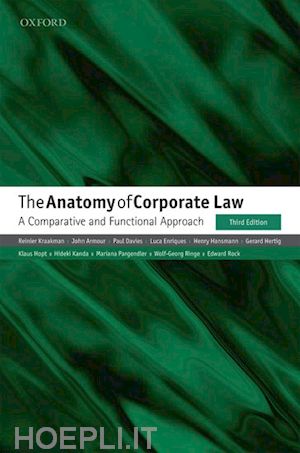Reinier Kraakman is the Ezra Ripley Thayer Professor of Law at Harvard Law School and a Fellow of the European Corporate Governance Institute. He has written numerous articles on corporate law and the economic analysis of corporate liability regimes. He teaches courses in corporate law, corporate finances, and seminars on the theory of corporate law and comparative corporate governance. John Armour is Hogan Lovells Professor of Law and Finance at the University of Oxford and a Fellow of the European Corporate Governance Institute. He was previously a member of the Faculty of Law and the interdisciplinary Centre for Business Research at the University of Cambridge. He has held visiting posts at various institutions including the University of Chicago, Columbia Law School, the University of Frankfurt, the Max Planck Institute for Comparative Private Law, Hamburg, and the University of Pennsylvania Law School. His main research interests lie in company law, corporate insolvency law, and financial regulation, in which areas he has published widely. He has been involved in policy projects commissioned by the UK's Department of Trade and Industry, Financial Services Authority and Insolvency Service, the Commonwealth Secretariat, and the World Bank. He currently serves as a member of the European Commission's Informal Company Law Expert Group. Paul Davies is a Senior Research Fellow in the Centre for Commercial Law at Harris Manchester College, University of Oxford. He was the Allen & Overy Professor of Corporate Law, University of Oxford, between 2009 and 2014. Between 1998 and 2009 he was the Cassel Professor of Commercial Law at the London School of Economics and Political Science. He was a member of the Steering Group for the Company Law Review which preceded the enactment of the Companies Act 2006, and has been involved recently in policy-related work for the UK Treasury. His most recent works include the 10th edition of Gower and Davies, Principles of Modern Company Law (Sweet & Maxwell, 2016, with Sarah Worthington); and Introduction to Company Law (OUP, 2nd ed., 2010). He is a Fellow of the European Corporate Governance Institute, a Fellow of the British Academy, and an honorary Queen's Counsel. Luca Enriques is the Allen & Overy Professor of Corporate Law in the Faculty of Law, University of Oxford, and a European Corporate Governance Institute Research Fellow. He has been Professor of Business Law at the University of Bologna and LUISS-Rome. Between 2007 and 2012, he served as a Commissioner at Consob, the Italian Securities and Exchange Commission. He has been Visiting Professor at various institutions, including Harvard Law School, Instituto de Impresa (Madrid), and IDC Herzliya. He has published several books and articles on topics relating to corporate law, corporate governance, and financial regulation. He is a coauthor, together with John Armour, Paul Davies, and others, of Principles of Financial Regulation (OUP, 2016). Henry Hansmann is the Oscar M. Ruebhausen Professor of Law at the Yale Law School. His scholarship has focused principally on the law and economics of organizational ownership and structure, and has dealt with all types of legal entities, both profit-seeking and nonprofit, private and public. He has been Professor or Visiting Professor at Harvard University, New York University, and the University of Pennsylvania Law Schools. Recent publications include Legal Entities as Transferable Bundles of Contracts (with Kenneth Ayotte), 111 Michigan Law Review 715 (2013), and External and Internal Asset Partitioning: Corporations and Their Subsidiaries (with Richard Squire), in Jeffrey Gordon and Georg Ringe (eds.), The Oxford Handbook of Corporate Law and Governance (OUP, forthcoming). He is a Fellow of the American Academy of Arts and Sciences and the European Corporate Governance Institute. Gerard Hertig is Professor of Law at ETH Zurich and a European Corporate Governance Institute research fellow. He was previously Professor of Administrative Law and Director of the Centre d'Études Juridiques Européennes at the University of Geneva Law School (1987-1995). He has been a visiting professor at leading law schools in Asia, Europe, and the United States, and practiced law as a member of the Geneva bar. Recent publications include Decision-Making During the Crisis: Why Did the Treasury Let Commercial Banks Fail? (with Ettore Croci and Eric Nowak), Journal of Empirical Finance (2016); Governance by Institutional Investors in a Stakeholder World, in The Oxford Handbook of Corporate Law and Governance (OUP, forthcoming); Shadow Resolutions as a No-No in a Sound Banking Union, with Luca Enriques, in Financial Regulation: A Transatlantic Perspective (CUP, 2015). Klaus Hopt was Director of the Max Planck Institute for Comparative and International Private Law in Hamburg, Germany. His main areas of specialization include commercial law, corporate law, and banking and securities regulation. He has be











